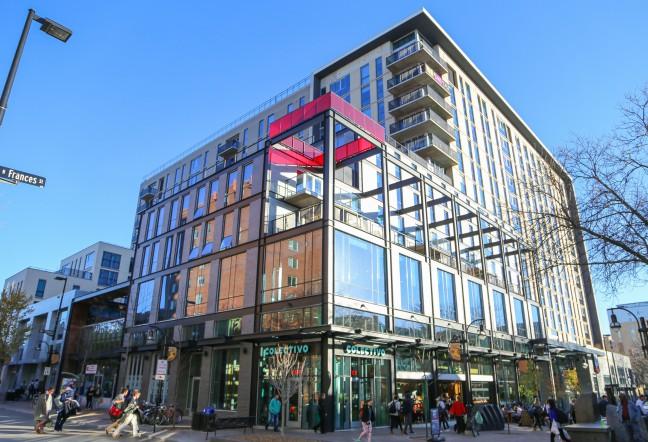Feb. 28, the Madison Common Council voted to approve an amendment to update the definition of “family” in the zoning code. The old definition restricted the number of people who could live in the same household based on the district and their relational status.
While the original proposal would have been more inclusive, the accepted version of the amendment increases housing capacity for renter-occupied units from two to three unrelated people in certain zoning districts. The accepted change, while perhaps a slight improvement, does not do enough to address the immensity of discriminatory, anti-renter housing policies in Madison.
According to the amendment, the old definition of “family” in the zoning code dates back to 1966. The definition was originally created to keep college students from renting properties in single-family neighborhoods. More than one-third of the land area in Madison is zoned to prevent more than two unrelated renters from living together, whereas owner-occupied households allow up to five unrelated residents.
The Badger Herald Editorial Board: Dismantling campus rape culture in the classroom
According to the Brookings Institution, this phenomenon is not exclusive to Madison. Many old zoning codes use density as a veil for segregating people based on income and race. But these discriminatory, outdated zoning codes are not conducive to modern-day efforts to equitably address Madison’s housing crisis.
For one, historically marginalized groups and younger people are more likely to rent than other groups, according to the Pew Research Center. The sponsors of the proposal amendment had similar findings — according to data from 2019, discrepancies in homeownership between white, Black and Hispanic residents are astounding. Compared to 52.7% of non-Hispanic white Madison residents, 30% of Hispanic residents of any race and just 15.3% of Black residents owned homes. Therefore, zoning ordinances that place added limits on renters also place undue burdens on marginalized groups.
Efforts to update the zoning ordinances are based on efforts to reduce de facto segregation. When renters face additional barriers to living in single-family, owner-occupied neighborhoods, the historical patterns of discrimination that have prevented marginalized groups from achieving homeownership in the first place are perpetuated.
Unless critical action is taken to examine how discrimination against renters produces harmful policy structures, housing arrangements will inevitably fall into historical patterns of segregation. Unfortunately, anti-renter attitudes are deeply ingrained in the American psyche.
In 1934, the Federal Housing Administration was created as part of the Roosevelt administration’s New Deal. Through a series of explicitly unjust policies, the FHA thoroughly racialized housing segregation and discrimination. In addition to refusing to insure mortgages for African Americans, the FHA subsidized the construction of suburbs on the condition that none of these homes would be sold to African Americans. Then, the FHA subsidized the moves of white families out of urban areas into the new suburban neighborhoods.
New funding proposal would help address veteran mental health care
According to NPR, the FHA justified these explicitly discriminatory policies on the baseless notion that allowing Black Americans to move into white neighborhoods would decrease property values and put their loans at risk. These policies remained in place until 1948, when the Supreme Court decision in Shelley v. Kraemer banned court-enforced restrictive covenants. By that point, however, Black Americans had already been systematically denied access to home ownership, entrenching conditions of segregation and creating generational impacts.
Negative attitudes toward renters — which are rooted in systemic racism — persist today. Many of the public comments from Madison residents who oppose the zoning amendment make derisive statements about renters. One resident expressed their disdain for late-night disturbances that came from their neighbor’s property that was “rented to a variety of unrelated people.” Another citizen worried the zoning change would convert single-family homes into “poorly managed, poorly maintained” rental housing. Other residents supported liberal policies to increase housing density — just not in their own neighborhoods.
But according to the sponsors of the amendment, many zoning districts allow for up to five unrelated individuals in the same unit without any negative impacts. When coupled with the obviously racially discriminatory history of housing policies, these kinds of comments must be considered from a critical perspective. Anti-renter attitudes have a racialized history that we cannot ignore. Policies that appeal to these attitudes must be examined critically for racist or otherwise discriminatory impacts.
Electric cars aren’t final solution for cleaner transportation
Less restrictive zoning policies that accommodate the diverse living situations of Madison renters have the potential to create several benefits. For one, allowing for more flexible zoning codes presents one way to increase in-unit density. While not a silver bullet solution to Madison’s housing crisis, it may help alleviate the situation in some neighborhoods.
Additionally, single-family zoning is undoubtedly discriminatory. According to the Brookings Institution, policies that increase single-family, owner-occupied homes limit the supply of sorely needed multifamily housing and promote an inefficient use of space in desirable neighborhoods. These policies have roots in exclusionary attitudes that had no place in zoning codes when they were created and certainly have no place in zoning codes today.
Providing a pathway for people who rent or who live with non-relatives to find homes in single-family areas presents an opportunity for Madison to diversify its neighborhoods. While perhaps seemingly bureaucratic and inconsequential, zoning policies actually provide the framework for who has the opportunity to buy homes and where.
The effort past policymakers have put into making home ownership in certain neighborhoods an exclusive privilege illustrates how valuable it can be. If Madison is to make progress on racial justice in housing, we must take steps to reduce limits on the number of unrelated residents in renter-occupied homes. Otherwise, historical conditions of racialized housing discrimination will persist.
Celia Hiorns ([email protected]) is a sophomore studying journalism and political science.




















